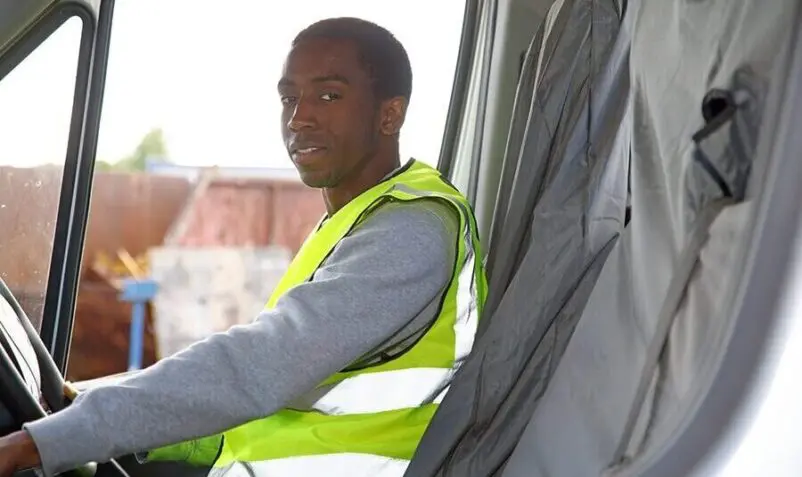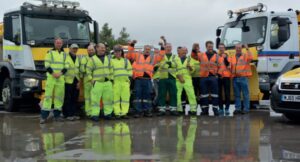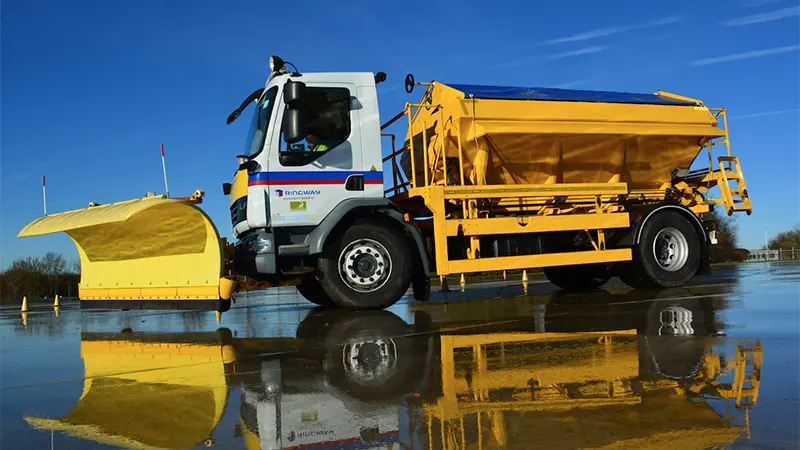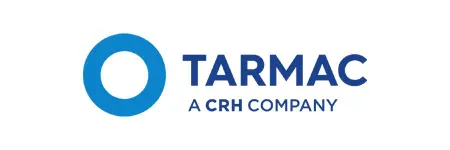
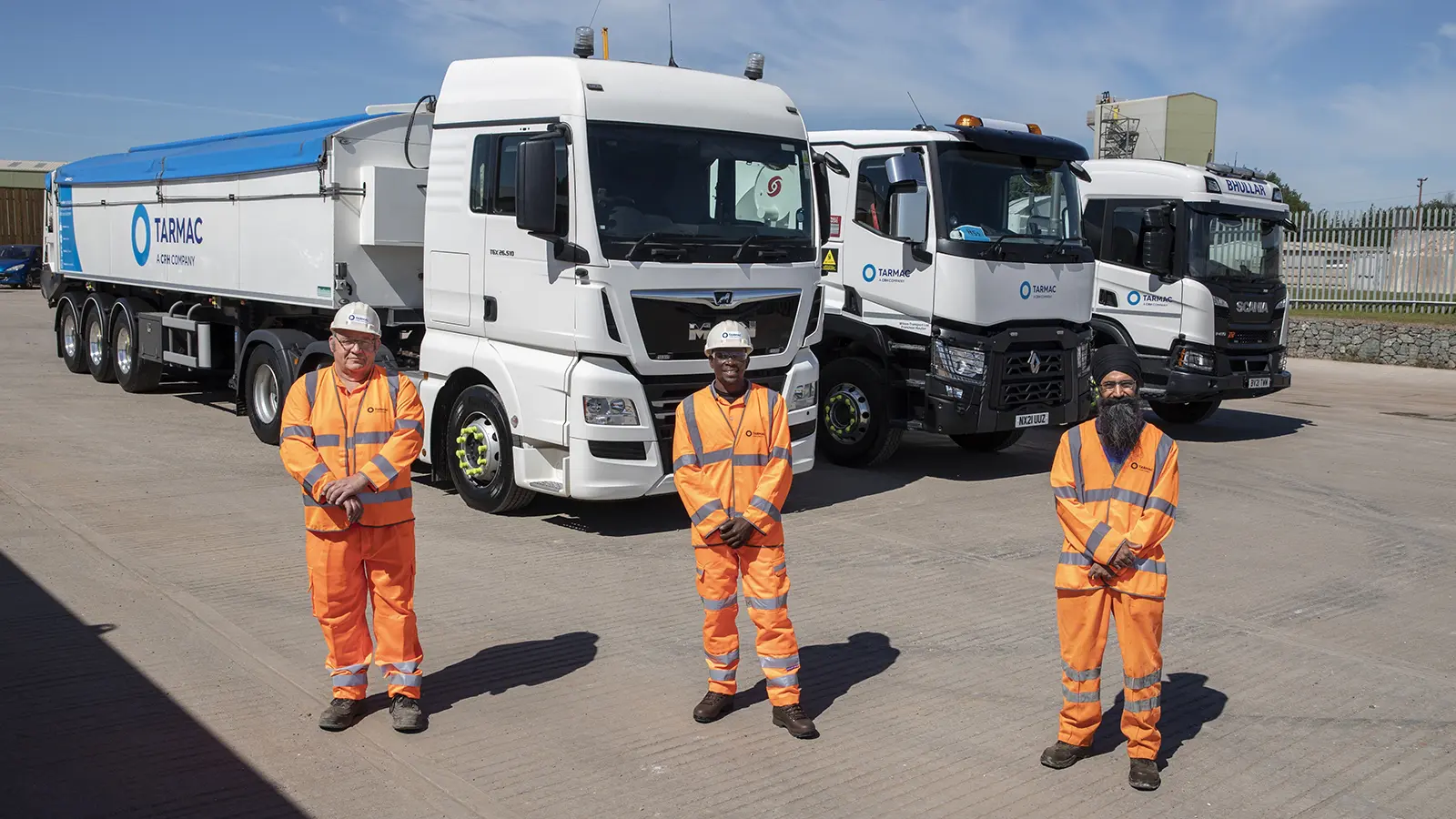
Fleet Size
Cars: 1200
Vans: 1200
Trucks: 2500
Other vehicles: 150
Tarmac is the UK’s leading sustainable building materials and construction solutions business. Transport and Logistics is an essential part of the Tarmac business, from sourcing materials from quarries to production sites to delivering materials to customer construction sites.
Tarmac operates a diverse HGV fleet UK wide, including a combination of tankers, rigid tippers and mixers, and mechanical moving floor articulated trailers. These are operated by a trained and professional community of drivers and contract hauliers.
Together with telematics partner Masternaut, Tarmac created on online National Logistics Dashboard to improve collection, analysis and reporting of all data from the Tarmac fleet. The objective was to monitor productivity, safety and sustainability so as to improve fleet performance in these three key business areas.
Summary of Achievements
Speeding
DOWN 10%
Average reduction nationally in speeding in 3 months
(best area 25%)
Insurance Claims
DOWN 48%
Reduction in insurance claims in 12 months
Vehicle Turnaround
IMPROVED 8%
Average improvement in turnaround times nationally in 2 months (best area 12%)
Idling
REDUCED 3.4%
Average reduction in engine idling nationally in 2 months (best area 5.3%)
Demonstrating leadership in driver safety
“As a leading responsible business with a nationwide fleet of HGVs, we are committed to advancing improvements to ensure that we maintain the highest possible standard for our fleet and anyone operating on behalf of Tarmac.
“Driving is recognised as one of the most hazardous activities that many of us will do during our working lives. Managing and mitigating work-related road risks is of paramount importance to us – with an ongoing emphasis on driver training and on influencing road user behaviour in order to prevent accidents happening.
“We’re always looking for ways to boost safety and enhance productivity, as well as introducing technology that allows us to enhance the driver and customer experience.
“We recognise that health and safety measures need to be continually reviewed and updated to guarantee that we maintain the highest possible standard for our fleet and for anyone operating on behalf of Tarmac. Collaboration is key and we’re proud to be working with partners, such as Driving for Better Business, National Highways and Masternaut, to maximise opportunities and drive improvements in this area.”
John Anderson
National Logistics Director
More details
Supported by DfBB Partners

Summary
Tarmac expressed an interest in monitoring performance and improving the productivity, safety and sustainability of their fleet using telematics data. Masternaut worked with Tarmac to create a live, online dashboard that displayed the data for three headline metrics that Tarmac wanted to focus on to achieve this objective: Turnaround time, Speeding and Idling. The dashboard provided an easy to access, one-stop shop location for all Tarmac reporting purposes and is used by everyone from depot managers to logistics directors. The dashboard was initially piloted in Yorkshire and was then rolled out across 400 sites nationwide.
The design and production of the dashboard was followed by a National Training Programme where Masternaut worked with Tarmac directors to shape a streamlined Standard Operating Procedure with the dashboard as the core tool used in reporting. Masternaut then ran workshops with all Tarmac managers to upskill them on the use of the dashboard, the new reporting procedure and the specific steps defined to create real impact on the ground. This combination of the dashboard development with a national training plan ensured the dashboard was understood and used to its full potential by employees of all levels.
Within the first few months, the dashboard was already highlighting significant reductions in speeding and idling. Insurance claims came down by 48% over the year while, at the same time, vehicle turnaround times were improved by 8%.
The challenge
A significant part of the Tarmac business revolves around the transportation of raw materials from quarries to production sites and of building materials to customer sites on time and safely. Tarmac has a large, national fleet comprised mostly of independent contract hauling companies to fulfil this need. The following requirements were identified in initial workshops with Tarmac:
- A standard one stop-shop location was needed to display all essential data for the national fleet
- An engaging and easily accessible format for all employees
- Meet the reporting requirements of both high level directors in the business and depot managers
- Live, reliable data to make immediate decisions and recommendations
- A simpler, more efficient reporting structure
- Clear instructions and training for all manager based in over 400 sites, on how to use the data to create real impact on the business
- Help embedding the new tool into the standard operating procedures to ensure long term effectiveness
The Solution
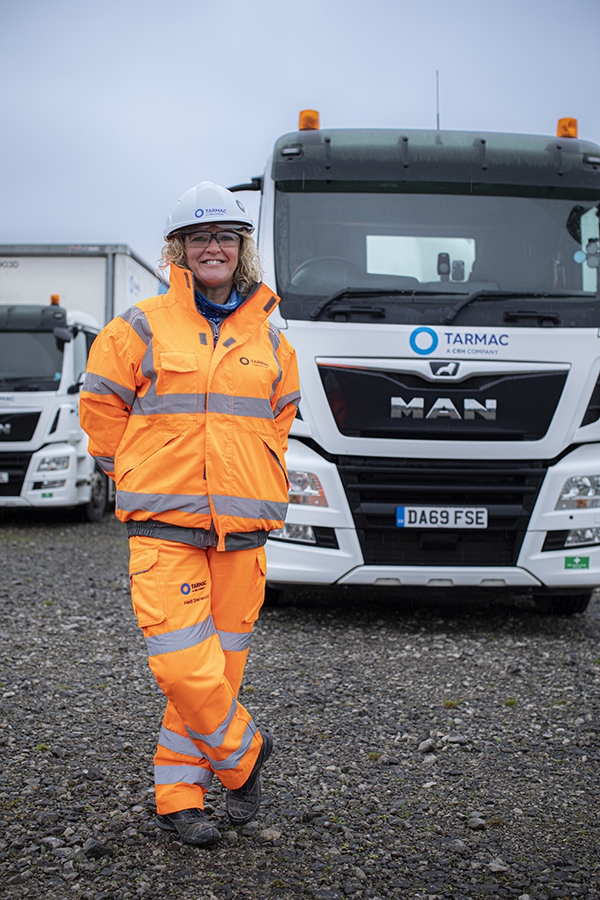 Project definition:
Project definition:
Masternaut worked with Tarmac to define 3 metrics they would like to focus on to achieve their key objectives of productivity, safety and sustainability. We focused on choosing metrics that can be measured using telematics data and can provide big savings on the ground through small improvements.
Productivity: Turnaround time of vehicles within Tarmac sites was chosen as the central metric for productivity.
Safety: Speeding was chosen as the metric for safety, in line with Tarmac’s commitment to a zero harm culture for their employees.
Sustainability: Idling was chosen as the indicator for sustainability to track CO2 emissions, reduce the environmental footprint and understand potential fuel savings that can be achieved.
Live National Dashboard:
- Masternaut worked with Tarmac to design a live national web-based dashboard that updates automatically every week with telematics data
- The dashboard includes all relevant data for all employees from drivers to logistics directors in one, easily accessible location in an engaging format
- Every employee gets a tailored view of the dashboard data based on their location and job role – this ensures everyone views data relevant to themselves at the click of a button
- There are timeline graphs to monitor trends in performance against a metric over time and comparison graphs to allow managers to compare the performance of their vehicles, sites and regions to others
- The dashboard can be used as an automatic reporting tool and saves time for all employees
- An excel spreadsheet with more detailed data on the graphs and timeline being viewed can be downloaded from the dashboard for further analysis if needed
- Masternaut also trained super users who will act as admin help within Tarmac and will ensure the smooth running and use of the dashboard
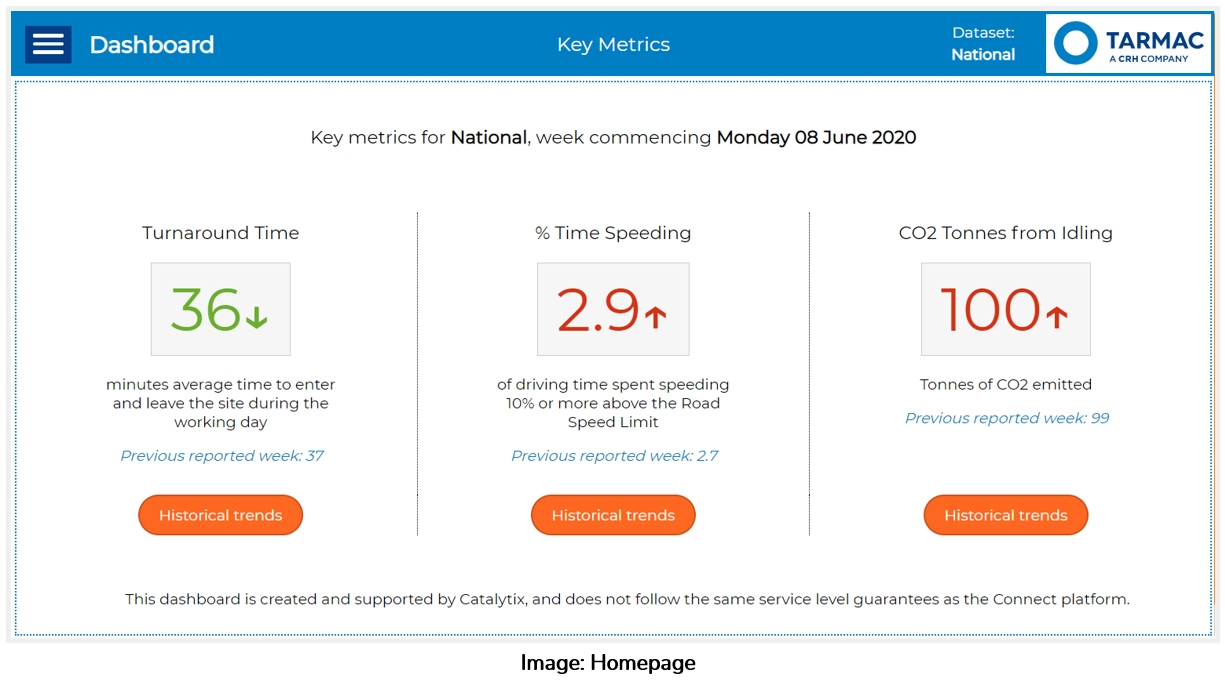
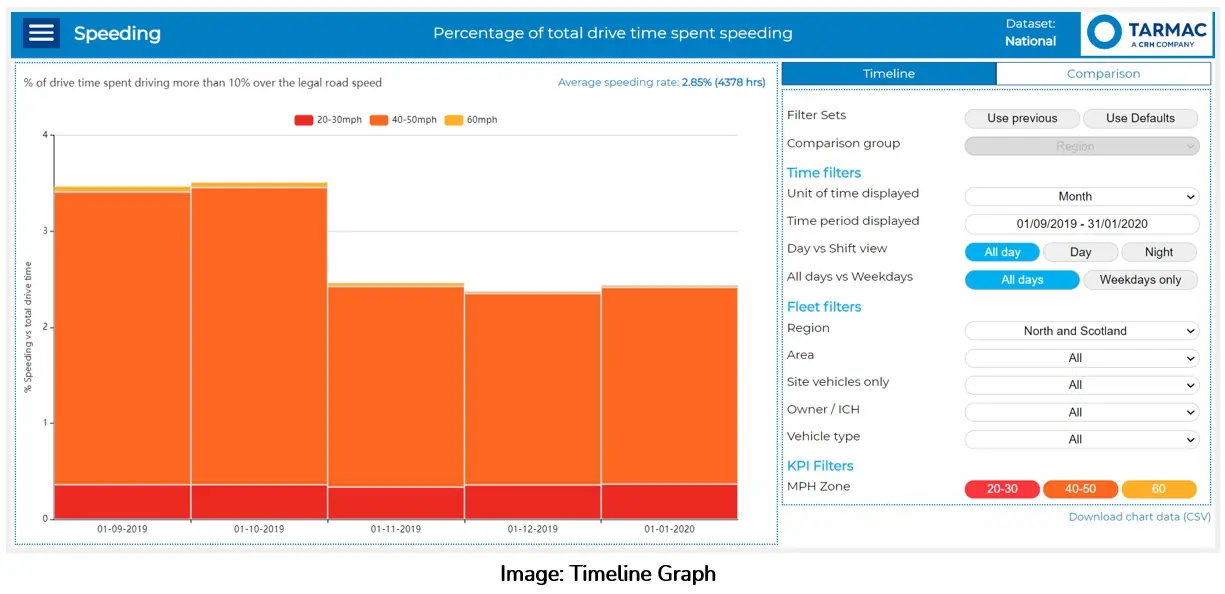
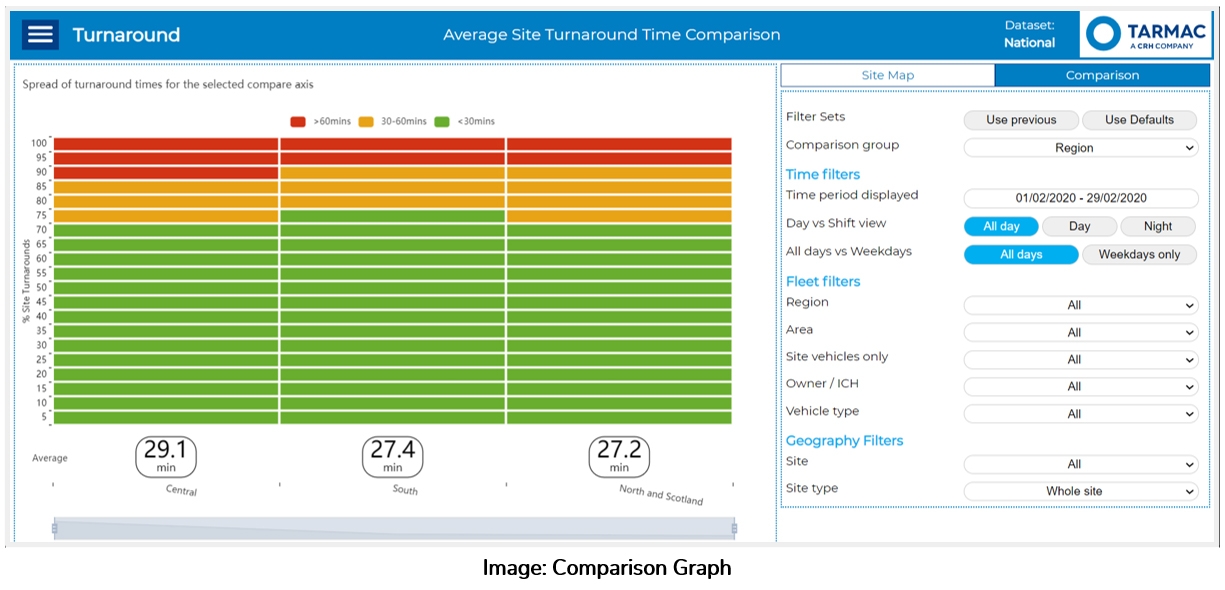
Live Manager Training Program:
- Masternaut worked with Tarmac to design a national training program and a new standard operating procedure to ensure maximum effectiveness of the dashboard
- Masternaut trained every manager at Tarmac on how to use the dashboard effectively for their role, how to interpret the data and how to keep the data updated
- The training included the roles and responsibilities of each level of manager in relation to the dashboard and how and when to execute these responsibilities
- Managers were given clear instructions on how to use the data to create real change on the ground, how to escalate recurring issues, how to report upwards and get support where needed
- Each manager left the training day with a clear list of objectives on how they will use the dashboard to get the most out of their team and a booklet to remind them of their responsibilities
- Senior managers and directors were also informed of the new reporting structures involved using the dashboard, which saves time for all employees involved
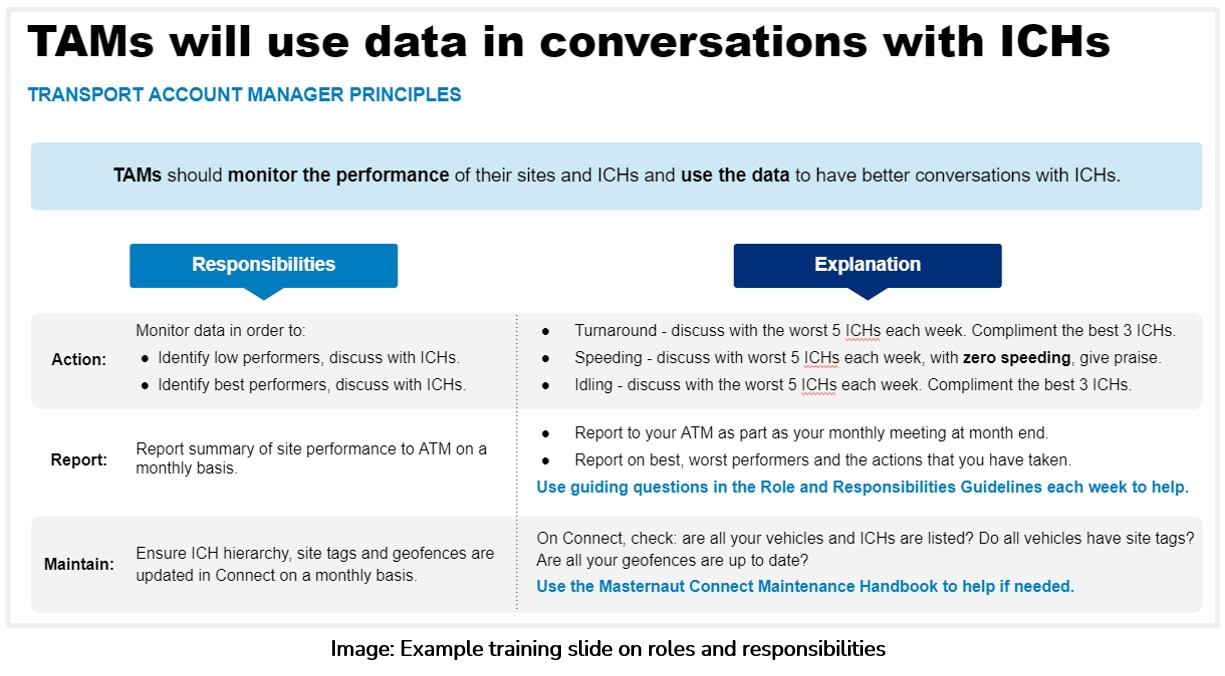
Business benefits
Speeding
DOWN 10%
Average reduction nationally in speeding in 3 months
(best area 25%)
Insurance Claims
DOWN 48%
Reduction in insurance claims in 12 months
Vehicle Turnaround
IMPROVED 8%
Average improvement in turnaround times nationally in 2 months (best area 12%)
Idling
REDUCED 3.4%
Average reduction in engine idling nationally in 2 months (best area 5.3%)
We saw clear tangible improvements in all three areas of focus: Productivity, Safety and Sustainability. Within 3 months, all metrics showed significant improvement:
- Average decrease in speeding across all areas (from Oct 2019 – Jan 2020): 10%
- Highest decrease in speeding seen in the North and Scotland region (from Oct 2019 – Jan 2020): 25%
- Average decrease in turnaround time across all areas (from Nov 2019 to Jan 2020): 8%
- Highest decrease in turnaround time seen in the South region (from Nov 2019 to Jan 2020): 11.8%
- Average decrease in idling across all areas (from Nov 2019 to Jan 2020): 3.4%
- Highest decrease in idling seen in the Central region (from Nov 2019 to Jan 2020): 5.3%
Reductions in fleet insurance claims
A continued focus on risk management has seen insurance claims fall consistently year on year, however, the culmination of the ongoing work along with the dashboard data has seen the largest single step change.
| Year (April to April) | Number of claims | % Reduction |
|---|---|---|
| 2016/17 | 589 | – |
| 2017/18 | 535 | 9.2% |
| 2018/19 | 489 | 8.6% |
| 2019/20 | 255 | 47.9% |
Other improvements that are more difficult to measure, but noticeable in operations include:
- Fuel and cost savings from improving turnaround time and idling
- Increased focus by drivers on reducing and monitoring speed, improving safety on the road
- Time saved for employees at all levels in reporting through the single, easily accessible location of the dashboard
- Ease in encouraging competition between drivers and regional managers to improve standards
- Managers are able to set targets and monitor the performance of their drivers regularly with ease
Leadership of road risk management
John Anderson, national logistics director for Tarmac, said:
“As a leading responsible business with a nationwide fleet of HGVs, we are committed to advancing improvements to ensure that we maintain the highest possible standard for our fleet and anyone operating on behalf of Tarmac.
“Driving is recognised as one of the most hazardous activities that many of us will do during our working lives. Managing and mitigating work-related road risks is of paramount importance to us – with an ongoing emphasis on driver training and on influencing road user behaviour in order to prevent accidents happening.
“We’re always looking for ways to boost safety and enhance productivity, as well as introducing technology that allows us to enhance the driver and customer experience.
“We recognise that health and safety measures need to be continually reviewed and updated to guarantee that we maintain the highest possible standard for our fleet and for anyone operating on behalf of Tarmac. Collaboration is key and we’re proud to be working with partners, such as Driving for Better Business, National Highways and Masternaut, to maximise opportunities and drive improvements in this area.”



